

Discovery of a mechanism that makes tumor cells sugar addicted. For almost a hundred years ago is known that cancer cells feel a special appetite for a type of sugar called glucose.
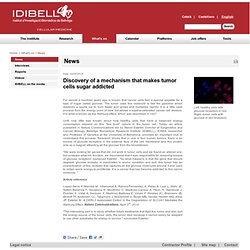
The tumor uses this molecule is like the gasoline which depends a sports car to burn faster and grows and multiplies rapidly. It is a little cash process from the energy point of view but allows a superaccelerated cancer cell division. It is what is known as the Warburg effect, which was described in 1927. Until now little was known about how healthy cells that have a balanced energy consumption depend on this “fast food" calorie in the tumor cell. Air Pollution Is a Leading Cause of Cancer.
By Kate Kelland and Stephanie Nebehay LONDON/GENEVA (Reuters) - The air we breathe is laced with cancer-causing substances and is being officially classified as carcinogenic to humans, the World Health Organization's cancer agency said on Thursday.
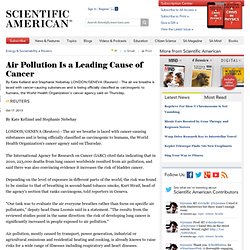
The International Agency for Research on Cancer (IARC) cited data indicating that in 2010, 223,000 deaths from lung cancer worldwide resulted from air pollution, and said there was also convincing evidence it increases the risk of bladder cancer. Depending on the level of exposure in different parts of the world, the risk was found to be similar to that of breathing in second-hand tobacco smoke, Kurt Straif, head of the agency's section that ranks carcinogens, told reporters in Geneva. "Our task was to evaluate the air everyone breathes rather than focus on specific air pollutants," deputy head Dana Loomis said in a statement.
Air pollution is highly variable over space and time. Caught in the act: Researchers capture key moments in cell death. Public release date: 2-Feb-2013 [ Print | E-mail Share ] [ Close Window ] Contact: Vanessa Solomonsolomon@wehi.edu.au 61-393-452-971Walter and Eliza Hall Institute Scientists at the Walter and Eliza Hall Institute have for the first time visualised the molecular changes in a critical cell death protein that force cells to die.
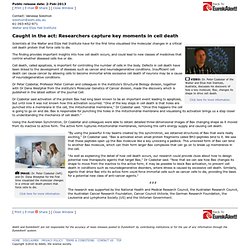
The finding provides important insights into how cell death occurs, and could lead to new classes of medicines that control whether diseased cells live or die. Cell death, called apoptosis, is important for controlling the number of cells in the body. Dr Peter Czabotar, Professor Peter Colman and colleagues in the institute's Structural Biology division, together with Dr Dana Westphal from the institute's Molecular Genetics of Cancer division, made the discovery which is published in the latest edition of the journal Cell.
Scientists develop probiotic to target tumours. Scientists at University College Cork have developed an innovative way to target cancer treatment at tumours — by placing the drug in bacteria which attaches to the tumours.
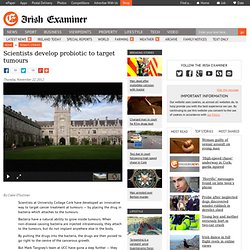
Bacteria have a natural ability to grow inside tumours. University of Southampton. Suffocating tumours could lead to new cancer drugs Ref: 13_142 26 July 2013 Suffocating tumours could lead to new cancer drugs Scientists have discovered a new molecule that prevents cancer cells from responding and surviving when starved of oxygen and which could be developed into new treatments for the disease, according to new research published in the Journal of the American Chemical Society* today (Friday).
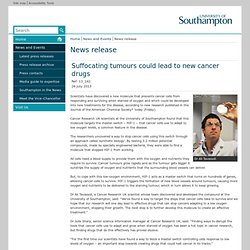
Cancer Research UK scientists at the University of Southampton found that this molecule targets the master switch – HIF-1 – that cancer cells use to adapt to low oxygen levels, a common feature in the disease. The researchers uncovered a way to stop cancer cells using this switch through an approach called ‘synthetic biology’. All cells need a blood supply to provide them with the oxygen and nutrients they require to survive. Protein 'passport' helps nanoparticles get past immune system. The body's immune system exists to identify and destroy foreign objects, whether they are bacteria, viruses, flecks of dirt or splinters.
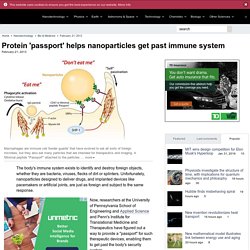
Unfortunately, nanoparticles designed to deliver drugs, and implanted devices like pacemakers or artificial joints, are just as foreign and subject to the same response. Now, researchers at the University of Pennsylvania School of Engineering and Applied Science and Penn's Institute for Translational Medicine and Therapeutics have figured out a way to provide a "passport" for such therapeutic devices, enabling them to get past the body's security system. The research was conducted by professor Dennis Discher, graduate students Pia Rodriguez, Takamasa Harada, David Christian and Richard K. Tsai and postdoctoral fellow Diego Pantano of the Molecular and Cell Biophysics Lab in Chemical and Biomolecular Engineering at Penn.
It was published in the journal Science. Immortality Gene Mutation Identifies Brain Tumors And Other Cancers. A collaborative research effort by scientists at the Duke Cancer Institute, Johns Hopkins, and several other participants have identified gene mutations in TERT promoters.
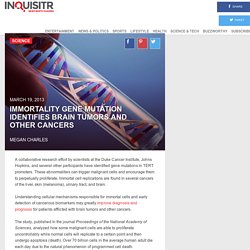
These abnormalities can trigger malignant cells and encourage them to perpetually proliferate. Immortal cell replications are found in several cancers of the liver, skin (melanoma), urinary tract, and brain. Understanding cellular mechanisms responsible for immortal cells and early detection of cancerous biomarkers may greatly improve diagnosis and prognosis for patients afflicted with brain tumors and other cancers. Kryptonite for cancer cells. (Phys.org) —Every available cancer drug is susceptible to resistance, according to Mansoor Amiji, Distinguished Professor and chair of the Department of Pharmaceutical Sciences.
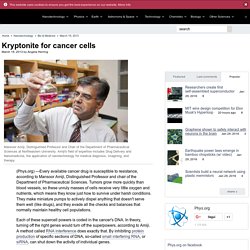
Tumors grow more quickly than blood vessels, so these unruly masses of cells receive very little oxygen and nutrients, which means they know just how to survive under harsh conditions. They make miniature pumps to actively dispel anything that doesn't serve them well (like drugs), and they evade all the checks and balances that normally maintain healthy cell populations.
Each of these supercell powers is coded in the cancer's DNA. In theory, turning off the right genes would turn off the superpowers, according to Amiji. Study reveals how melanoma evades chemotherapy. Nitric oxide (NO), a gas with many biological functions in healthy cells, can also help some cancer cells survive chemotherapy.
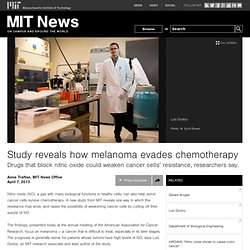
Researchers Use Grapefruits to Fight Cancer : Biology. May 22, 2013 04:56 AM EDT Researchers have now found a way to use lipids from grapefruits to deliver drugs that fight cancer.
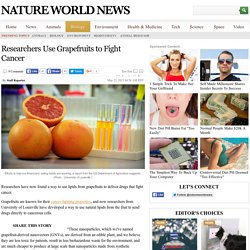
Grapefruits are known for their cancer-fighting properties, and now researchers from University of Louisville have developed a way to use natural lipids from the fruit to send drugs directly to cancerous cells. "These nanoparticles, which we've named grapefruit-derived nanovectors (GNVs), are derived from an edible plant, and we believe they are less toxic for patients, result in less biohazardous waste for the environment, and are much cheaper to produce at large scale than nanoparticles made from synthetic materials," said Huang-Ge Zhang from University of Louisville, one of the study authors. The study is published in the journal Nature Communications. The research team demonstrated that the GNVs can deliver various anti-cancer agents such as DNA/RNA, proteins and drugs. Scientists discover how rapamycin slows cell growth. Jeudi, 23 Mai 2013 12:44 News Dr. Genetics alone does not explain cancer growth. Genetic mutations are not the only contributing factor in the growth of cancerous tumours, say scientists.
Research showed tumour cells that were genetically indistinguishable had varying capacities for cell division and resistance to chemotherapy treatment. 'I thought we'd be able to look at the genetics that let some cells propagate, or not be susceptible to chemotherapy, but lo and behold there was no genetic difference', said Professor John Dick of the University of Toronto, Canada, who led the study. 'That goes against a main dogma of the cancer enterprise: that if a tumour comes back after treatment it's because some cells acquired mutations that made them resistant'. Cells from ten human colorectal cancers were injected into mice, resulting in tumours.
New target for treating wide spectrum of cancers. Irvine, Calif., Jan. 30, 2013 — UC Irvine biologists, chemists and computer scientists have identified an elusive pocket on the surface of the p53 protein that can be targeted by cancer-fighting drugs. The finding heralds a new treatment approach, as mutant forms of this protein are implicated in nearly 40 percent of diagnosed cases of cancer, which kills more than half a million Americans each year. In an open-source study published online this week in Nature Communications, the UC Irvine researchers describe how they employed a computational method to capture the various shapes of the p53 protein.
In its regular form, p53 helps repair damaged DNA in cells or triggers cell death if the damage is too great; it has been called the “guardian of the genome.” Mutant p53, however, does not function properly, allowing the cancer cells it normally would target to slip through control mechanisms and proliferate. Quadruple helix DNA find key to cancer cure?
New Form of Human Cell Division Discovered. Scientists at the University of Wisconsin Carbone Cancer Center report the discovery of a novel type of cell division in human cells. They believe it serves as a natural back-up mechanism during faulty cell division. "If we could promote this new form of cell division, which we call klerokinesis, we may be able to prevent some cancers from developing," says lead researcher Mark Burkard, M.D., Ph.D., an assistant professor of hematology-oncology in the department of medicine at the UW School of Medicine and Public Health. He presented the finding yesterday at the American Society for Cell Biology’s annual conference in San Francisco. Dr. Burkhard, a physician investigator who treats breast cancer patients, also studies polyploidy.